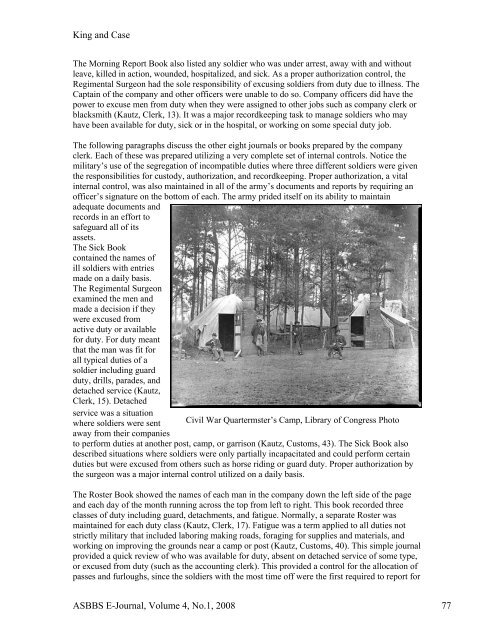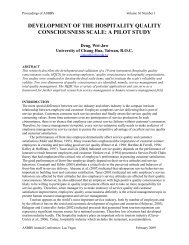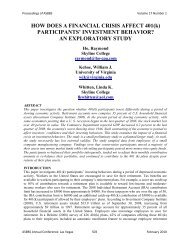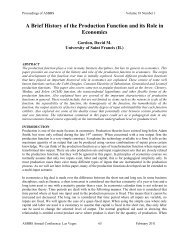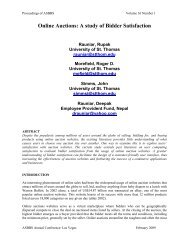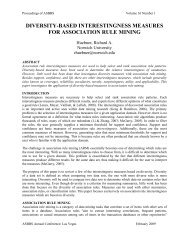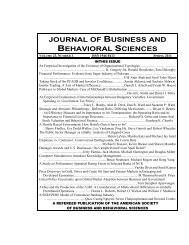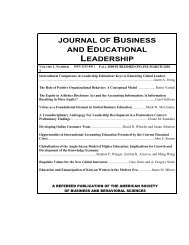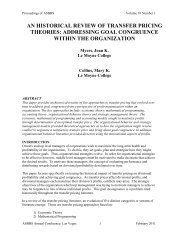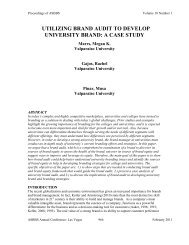stock repurchase announcements: a test of market ... - Asbbs.org
stock repurchase announcements: a test of market ... - Asbbs.org
stock repurchase announcements: a test of market ... - Asbbs.org
Create successful ePaper yourself
Turn your PDF publications into a flip-book with our unique Google optimized e-Paper software.
King and Case<br />
The Morning Report Book also listed any soldier who was under arrest, away with and without<br />
leave, killed in action, wounded, hospitalized, and sick. As a proper authorization control, the<br />
Regimental Surgeon had the sole responsibility <strong>of</strong> excusing soldiers from duty due to illness. The<br />
Captain <strong>of</strong> the company and other <strong>of</strong>ficers were unable to do so. Company <strong>of</strong>ficers did have the<br />
power to excuse men from duty when they were assigned to other jobs such as company clerk or<br />
blacksmith (Kautz, Clerk, 13). It was a major recordkeeping task to manage soldiers who may<br />
have been available for duty, sick or in the hospital, or working on some special duty job.<br />
The following paragraphs discuss the other eight journals or books prepared by the company<br />
clerk. Each <strong>of</strong> these was prepared utilizing a very complete set <strong>of</strong> internal controls. Notice the<br />
military’s use <strong>of</strong> the segregation <strong>of</strong> incompatible duties where three different soldiers were given<br />
the responsibilities for custody, authorization, and recordkeeping. Proper authorization, a vital<br />
internal control, was also maintained in all <strong>of</strong> the army’s documents and reports by requiring an<br />
<strong>of</strong>ficer’s signature on the bottom <strong>of</strong> each. The army prided itself on its ability to maintain<br />
adequate documents and<br />
records in an effort to<br />
safeguard all <strong>of</strong> its<br />
assets.<br />
The Sick Book<br />
contained the names <strong>of</strong><br />
ill soldiers with entries<br />
made on a daily basis.<br />
The Regimental Surgeon<br />
examined the men and<br />
made a decision if they<br />
were excused from<br />
active duty or available<br />
for duty. For duty meant<br />
that the man was fit for<br />
all typical duties <strong>of</strong> a<br />
soldier including guard<br />
duty, drills, parades, and<br />
detached service (Kautz,<br />
Clerk, 15). Detached<br />
service was a situation<br />
where soldiers were sent Civil War Quartermster’s Camp, Library <strong>of</strong> Congress Photo<br />
away from their companies<br />
to perform duties at another post, camp, or garrison (Kautz, Customs, 43). The Sick Book also<br />
described situations where soldiers were only partially incapacitated and could perform certain<br />
duties but were excused from others such as horse riding or guard duty. Proper authorization by<br />
the surgeon was a major internal control utilized on a daily basis.<br />
The Roster Book showed the names <strong>of</strong> each man in the company down the left side <strong>of</strong> the page<br />
and each day <strong>of</strong> the month running across the top from left to right. This book recorded three<br />
classes <strong>of</strong> duty including guard, detachments, and fatigue. Normally, a separate Roster was<br />
maintained for each duty class (Kautz, Clerk, 17). Fatigue was a term applied to all duties not<br />
strictly military that included laboring making roads, foraging for supplies and materials, and<br />
working on improving the grounds near a camp or post (Kautz, Customs, 40). This simple journal<br />
provided a quick review <strong>of</strong> who was available for duty, absent on detached service <strong>of</strong> some type,<br />
or excused from duty (such as the accounting clerk). This provided a control for the allocation <strong>of</strong><br />
passes and furloughs, since the soldiers with the most time <strong>of</strong>f were the first required to report for<br />
ASBBS E-Journal, Volume 4, No.1, 2008 77


